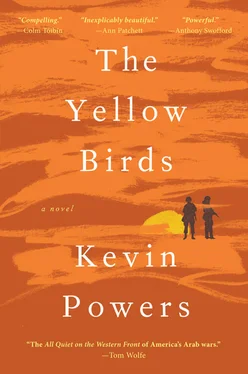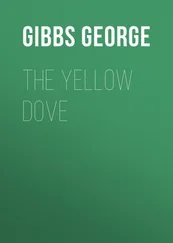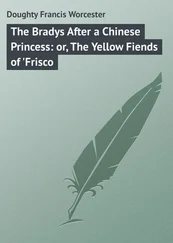It was barely perceptible, that noise. I still hear it sometimes. Sound is a funny thing, and smell. I’ll light a fire in the back lot of my cabin after the sun goes down. Then after a while, the smoke settles down into little ruts between clumps of pine. Wind whips up through the draws nearby and courses over the creek bed. And I can hear it then. I was not sure if it really came from the women around the campfires, if they pulled their hair crying out in mourning or not, but I heard it and even now it seems wrong not to listen. I took off my helmet and placed my rifle on top of it and allowed my ears to adjust to the ambient sounds in the night. There was something out there. I glanced at Murph and he returned a sad and knowing look. The LT put the radio down and sat in his chair with his head in his hands rubbing the strange mark on his cheekbone. We all listened to it awhile, watching the fires burn against the night. My chest tightened. There was something both ordinary and miraculous about the strange wailing that we heard, and the way it carried to us on the wind that began inside the orchard. Later in the night two of the lights in the distance began to brighten, then another two, and then another. The LT walked to each of us and said, “The colonel wants to see you guys. Get ready.”
We put our rifles out over the wall and gripped the forestocks tightly. We put out our cigarettes and asserted ourselves against the silence beyond our small encampment. I felt like a self-caricature, that we were falsely strong. When we spoke, we spoke brusquely and quietly and deepened our voices.
The lights formed a more regular line and we began to hear the whine of motors and then the lights disappeared and a cloud of dust rolled toward us above the ground from the front of the building near the road. The LT moved around our defensive perimeter and softly called out to us, “Stay alert. Stay alive.”
Two young sergeants quickly moved from around the building and spread out to either end of the wall. Then the colonel came, short, red-haired and walking upright as tall as he could. He had a reporter and a cameraman with him. The LT exchanged a few words with him and they both turned to us. “How’s the war tonight, boys?” he asked. A broad smile spread over his face in the darkness.
“Good,” Sterling replied with a dull certainty.
As if in need of confirmation, the colonel slowly met each of us eye to eye until we’d all said, “Yes, sir, it’s good tonight.”
Even in the intermittent light the crispness of his uniform was clearly visible. He smelled of starch when he came close to us. He folded his arms across his chest and began to speak, and the smile on his face disappeared. I briefly wondered which face was the real one before he pulled out a piece of paper and began to read from it, pausing ever so slightly to make sure the reporter was paying attention, “Are you rolling?”
“Go ahead. Pretend we’re not here.”
The colonel cleared his throat and pulled a pair of glasses out of his pocket and rested them on the bridge of his nose. One of the sergeants came over and shined a small flashlight on the colonel’s piece of paper. “Boys,” he began, “you will soon be asked to do great violence in the cause of good.” He paced back and forth and his boot prints in the fine dust were never trampled. Each step was precise and his pacing only served to firm and define the tracks that he originally left. The sergeant with the flashlight paced beside him. “I know I don’t have to tell you what kind of enemy you’ll be up against.” His voice became a blunt staccato as he gained confidence in his capacity to motivate us, a bludgeon that smoothed the weary creases in my brain. “This is the land where Jonah is buried, where he begged for God’s justice to come.” He continued, “We are that justice. Now, I wish I could tell you that all of us are coming back, but I can’t. Some of you will not come back with us.” I was moved then, but what I now recall most vividly about that speech was the colonel’s pride, his satisfaction with his own directness, his disregard for us as individuals. “If you die, know this: we’ll put you on the first bird to Dover. Your families will have a distinction beyond all others. If these bastards want a fight, we’re going to give them one.” He paused. A look of great sentimentality came over him. “I can’t go with you boys,” he explained with regret, “but I’ll be in contact from the operation center the whole time. Give ’em hell.”
The LT started a round of applause. We’d been told to maintain noise and light discipline, but that had all gone out the window with the camera crew and the colonel’s half-assed Patton imitation. I could tell the colonel was disappointed. I looked at the rest of the platoon to see if I could read anything on their faces. Murph gazed down at the toes of his boots. Sterling listened attentively on a knee from underneath the hawthorn tree. The fires in the dark became lights that fluttered on the backs of my closed eyelids.
The colonel gestured toward the LT, extending his arm out to him, palm up. “Lieutenant, they are all yours.”
“Thank you, sir.” He cleared his throat three times. “All right, boys, we’ll be on fifty-percent security tonight. We move from this position just before light, crossing the open ground out there while we still have the cover of darkness.” There were a few glances over shoulders into the barren space between our position and the city proper. It was far too dark to see into it, but the images were there like an etching through the night. The stench of the dead had cut itself free from the other odors coming from Al Tafar. The trash fires and sewage, the heavy scent of cured lamb, the river; above all this was the stink of decay from the bodies themselves. A shudder ran through my shoulders, a quick shake, as I hoped not to step into the slick mess of one of them as we marched to the fight. “We’ll clear the open ground and pass along the road that swings around the city, using the buildings on the outskirts for cover. When we get to the orchard, we’ll spread out along this ditch here.” He pointed to a map illuminated by a pale green glow stick. It showed a narrow scratch in the earth, buildings crowded behind it, not forty yards from the first trees in the orchard. “Any questions?”
“What then?” someone asked.
The LT glanced timidly at the colonel, bit his lip and said, “They’re in there. We’re going in there.”
Then it was quiet. It seemed we were all measuring the distances we’d travel in the morning. The bends in the road between corners of buildings, a low wall here, there an upended dumpster we could use for cover. The heights of the trees, low enough so we’d enter the orchard hunching, passing through leaves once heavy with citrus and olive, the trees planted in rows so orderly that we thought we’d have clear views from one end of the world to the other. But the orchard was much too large for that. We didn’t know that yet because we hadn’t seen it from the inside. It filled dozens of acres between two spurs of bald, grassy earth that drooped down toward the city. The ground in the little valley lay flat in spots, heaved up in others, the whole of it covered by the old growth of fruit trees and two or three times grafted branches.
The colonel’s voice snapped up our attention. “We’re gonna drop mortars in that rathole for two hours before dawn. They’ll still be shredding those little trees right when you get up to ’em. We’re counting on you, boys. The people of the United States are counting on you. You may never do anything this important again in your entire lives.”
He hupped the two sergeants and the embedded reporters he’d brought with him, and they pulled off from the wall and trotted back to the front of the building. We heard his vehicle start. I heard him ask the reporter how the shots looked and then he was gone.
Читать дальше












